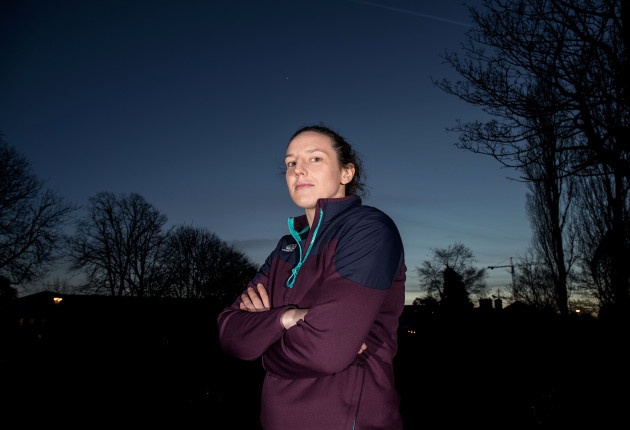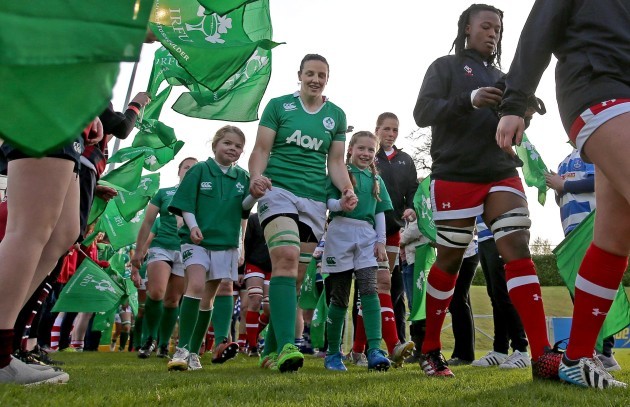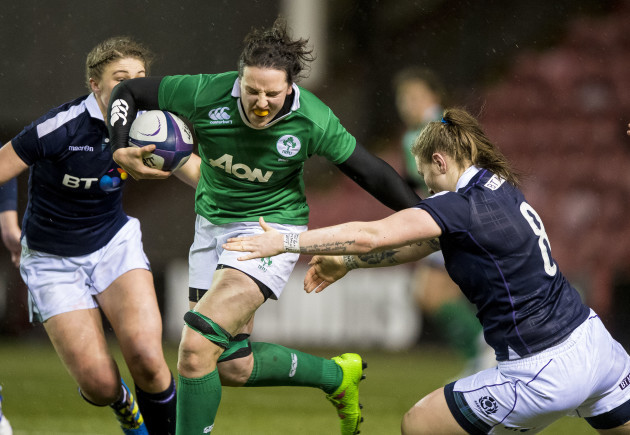WOMEN’S RUGBY IS a sport that has come on leaps and bounds in Ireland over the past few years.
Numerous successes and achievements — two Six Nations titles, a Grand Slam, that historic World Cup win over the All Blacks and a successful bid to become the 2017 hosts, to name but a few — have paved the way for increased recognition, funding and overall interest throughout the country.
That being said, across the water things have become even more advanced.
Reigning World Cup champions England’s set-up has turned professional. In 2014, the Rugby Football Union awarded full-time professional contracts to members of the women’s squad, a move which understandably had people talking this side of the Irish Sea.
Ireland captain Paula Fitzpatrick is unsure about the professional approach however. The Dubliner admits that it could happen here in the foreseeable future, but it’s a change she’d hesitate to welcome.
“They’ve twenty contracted players I think. It is a challenge, I suppose. People have asked me that before — ‘are you jealous of England?’ No is the answer.
I think that’s fantastic for them and it’s great that they’re able to now devote more time to training, particularly recovery. It’s great for them but I don’t know if it would suit us to turn professional. I think it’s good for players to have things outside of rugby, that they have their jobs that they can go to.
“I think it’s [rugby] something that you love and that you enjoy, and sometimes if it’s your job there’s a lot of pressure, I mean obviously there’s pressure anyway, but with contracts and money comes added pressure that maybe wasn’t there before. That brings with it a whole new set of challenges and that’s something that England will have to deal with. But I suppose, we’re in the position we’re in.”
“I think it could [happen here in the next few years]. It would depend on where the funding was going to come from. At the moment with sevens there’s Olympic funding, and that’s how the money is there. Now with the increased publicity, things like televising the games maybe sponsorship would come through that way. But I don’t know, it depends where the funding would come from.”
Although not professional, one thing that’s certain in the Irish set-up is that they have found a viable system. In other countries, they specialise in either sevens rugby or 15-a-side and players set their focus on one, not both.
Over the past few years, Ireland have worked hard to try and find level footing, with the efforts coming to fruition in recent times. They’ve struck a balance and found a system that works to facilitate both camps, and players that want to go between the two sides.
“I think it makes sense given our player base that there is transfer between the two,” Fitzpatrick continues. “We just don’t have the number of players that other countries may have to stay specialised in one.
“Having transfer between the two makes sense to me, but it is about, I suppose, prioritising year to year what the focus is and then allowing whichever players are selected for each one the room to progress in those instead of chopping and changing.”
Not only is the women’s game being built on and improved in Ireland and England, its rise to the fore is also fast-moving further afield.
Fitzpatrick is the perfect candidate to discuss these changes, considering her stint with French side Toulouse last year. Having tasted a different atmosphere, playing abroad is memory she cherishes.
Her plan was to spend a year there, which she did and afterwards there was an option to extend her stay. It was a tough decision, but at the end of the day she knew what had to be done.
“Bills have to be paid,” she smiles. “I know obviously I want to advance my career myself as well. It was a great experience I really enjoyed it and I got a sense of that professional atmosphere.
“I can only speak about Toulouse, but in Toulouse they had four players that were given a bit of assistance, not paid, but just helped out with accommodation and things like that and the rest of the players were just ordinary club players.”
I think it gave me a different perspective on how rugby is played. I’m not sure if it made me a better player, but say over here we’re very focused on structure and game plans and over there it’s all about play as you feel, and it’s about skill level and things like that.
“They’d play from when they’re maybe six years old which isn’t what we’re used to here. In the past, people would have taken up the game kind of at college level and things like that. Over there, players tend to be a lot more skilful individually — forwards and backs and everything. I suppose that kind of freedom that they play with was a new perspective for me.”
Another side the IT Carlow lecturer has witnessed an improved set-up shine through to their rugby is of course Scotland.
Ireland made a lucky escape at the Broadwood Stadium last Friday, and she’s well aware of that. In the past few years, Scotland had never posed a major threat but they fairly tested Tom Tierney’s women this time around.
“I haven’t seen them play that well in years and they’ve really been coming on. They have one professional player, their number 8, and then I think eight players are involved in the sub academy as well so they have a lot of extra supports available to them and that’s really starting to come. I think they’ll probably challenge a lot of teams in this Six Nations.
“We were happy in one sense that obviously we came away with the fourth try, bonus point and the win. But disappointed in ourselves in terms of we didn’t reach our own standards. Disappointed with the performance, but overall we’re delighted that we get another crack at it now this weekend.
“They say that about teams — if you can get out a performance even with playing below your standards, that’s a huge thing you can take from it. Things didn’t click from an overall sense but if you look at things like the set piece, that obviously went very well, the scrum was quite dominant, the line-out we had a lot of joy at as well.
“I’d say the main issues we had were around discipline, we gave away too many penalties and put them on the front foot. Obviously rugby is all about momentum so we kind of handed that back to them every opportunity we got really.
“Handling errors as well really let us down. Those are very very fixable things, they’re not things we would traditionally be known for so we’d be looking to put it right this weekend.”
Fitzpatrick and her side are more than content with the fact that they have the opportunity to line out again so soon, the opportunity to right their wrongs and hopefully retain their place at the top of the Six Nations table.
They meet up again on Friday before Sunday’s fixture, with most of the preparation work under their belts already. As she says herself, “there’s only a certain amount you can do on the pitch ahead of a game”.
Confident that they’ve done enough homework on their next assignment, Fitzpatrick is still wary of the opposition. That being said however, it’s a challenge she’s relishing and feels that her side are up to.
“They’ve some good players, we’ve had a look at them already. Their scrum-half Sara Barattin, she’d be one of their key players. Their back three will attack from anywhere, they’ll counter and they’re good kickers as well.
She puts it simply: “They’ll be tough. It’ll be a tough test.”
The42 is on Instagram! Tap the button below on your phone to follow us!



